Are oats considered gluten-free, and are they allowed in a gluten-free diet? Can oats be tolerated by those who suffer from celiac disease? And can oats be used in a raw vegan diet?
We get these and similar questions on a regular basis. That’s why we want to shed light on everything you need to know about oats in this article.
Oats Are a Valuable Source of Nutrients
Nutritionally, oats are one of the most important cereals in our diet:
- Oats are rich in vitamins and minerals: They contain plenty of B vitamins, including biotin (vitamin B7) and the minerals calcium, iron, potassium, copper, magnesium, manganese, phosphorus, selenium, silicon, and zinc.
- Oats can support the balance of our amino acid supply really well, due to the abundance of the essential amino acid lysine, which tends to be somewhat underrepresented in a plant-based diet.
- Oats contain the soluble dietary fiber beta-glucan. Beta-glucans regulate blood sugar, lower cholesterol, and activate the immune system. They are both filling and beneficial for intestinal health.
- Oats contain irritation-reducing mucilage.
- Oats are generally well tolerated, filling, and nourishing.
The Difference between Husky Oats and Naked Oats
To get to know the oat grain better, let’s first make the distinction between husky oats and naked oats:
Husky Oats
The original oat belongs to what are called cereal grains, like rice, barley, and spelt. Husks are thin coverings that tightly enclose the oat kernel even after the threshing process. They’re not edible or digestible for the human body.
This necessitates several further processing steps: in order to facilitate hulling, the oats are heated with steam to about 90º Celsius (194º Fahrenheit) and then kilned (dried). Drying makes the husks brittle and easier to remove.
This simultaneously makes the oats ready for storage and are thus ideally prepared for further processing into oat flakes. Oats have a relatively high fat content, which means that hulled oat grains, which can easily be damaged, quickly become rancid. Heat treatment inactivates the fat-degrading enzymes in the germ, which means that fatty acids are no longer broken down and oxidation of the fatty acids is delayed.
Additionally, this process provides the oat grain with some flavor. Through heating, the grains lose moisture and bitterness and gain a nutty aroma.
That being said, at this point they’re no longer able to germinate.
Naked Oats
Naked oats are a special breed in which the husk is so loosely attached to the grain that it falls off during threshing. It’s important that the grains are threshed very gently so that they’re not damaged.
This way, all the beneficial ingredients of the naked oats remain intact and the germination capacity is preserved – which is why it’s also known as sprouted grain.
Despite this valuable property, naked oats are grown much less because the grain is more susceptible to disease and yields significantly less.
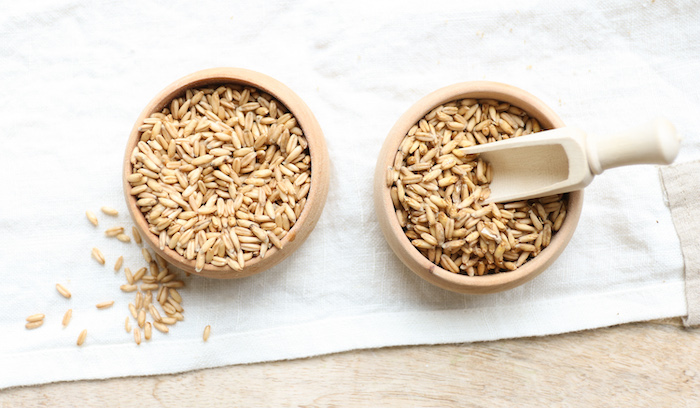
Are Oats Gluten-Free?
In professional circles, oats are referred to as being naturally gluten-free, with the following explanation: By “gluten,” we mean a mixture of proteins or protein fractions, specifically prolamins and glutelins. The prolamin in wheat is called gliadin, the prolamin in oats is called avenin. The decisive factor is the effect of the oat-specific protein avenin, which is considered to have less to no effect on celiac disease and, according to the German Celiac Society (GCS), causes an immunological reaction in only a few patients. Nevertheless, the GCS recommends that anyone with celiac disease introduce these “gluten-free” oats into their diet at a slow pace .
So why do we need oats sold in stores that are specifically labeled as gluten-free?
Typically oats are grown in fields previously used to grow wheat or other gluten-containing grains, with the same combines being used during harvest, and the same machines being used during processing. As a result, the oats are contaminated with residues from gluten-containing grains, which means they contain too much gluten for those with a gluten intolerance.
Oats sold in the grocery store that are marked as “gluten-free” thus indicates that there has been no cross-contamination with gluten-containing grains like wheat, spelt, or barley, both in cultivation and in the supply chain, and that the gluten content of the oat is 20 mg/kg or less.
Activated Rolled Oats
In raw vegan cuisine, we ideally use oats in their most nutrient-rich form. To do this, we activate naked oats to use them as a base for preparing oatmeal.
Note: Only raw naked oats are capable of germinating.
This Is How Sprouting Naked Oats Works
For storage, we recommend soaking 1 kg of oats for about 8 hours, submerged in water:
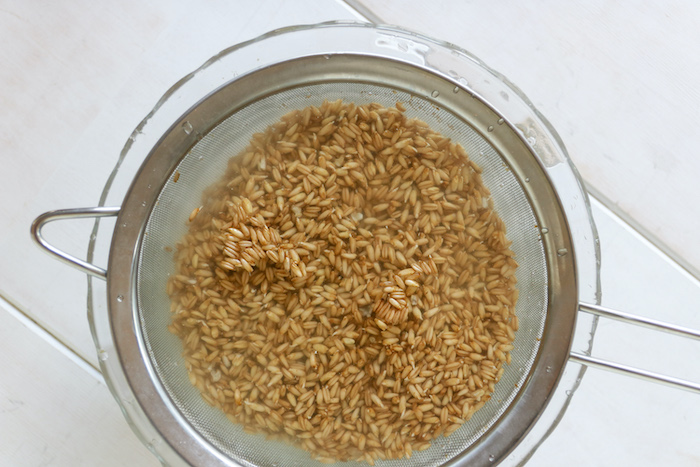
- Rinse with fresh water in the morning and allow them to germinate for 2-3 days in large sieves at approx. 20º Celsius (68º Fahrenheit)
- Continue to rinse thoroughly with fresh water in the morning and evening.

Small spikes are already visible on the 2nd day.
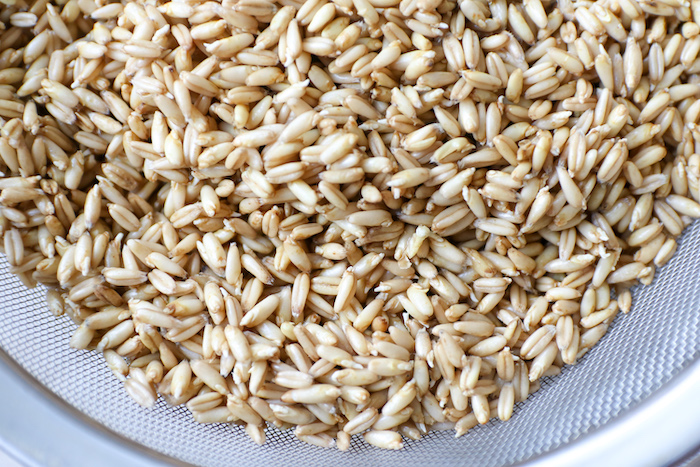
At this stage, dry the oats for about 12 hours at 40º Celsius (104º Fahrenheit) in a dehydrator. For storage, the grains must be thoroughly dried to avoid mold.
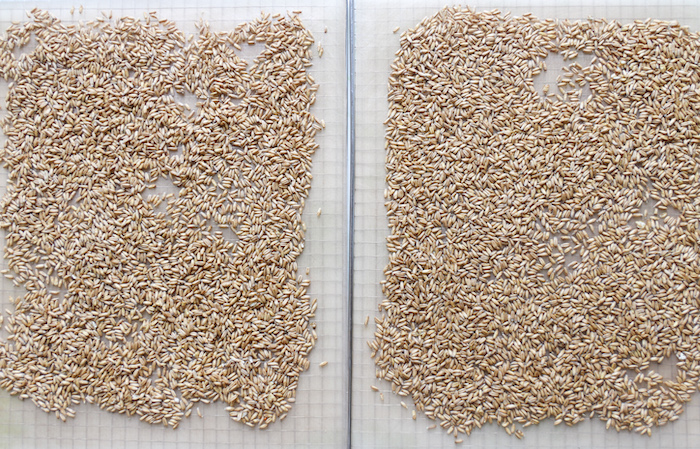
If you have a flake press, you can now make your own sprouted oat flakes and use them for delicious breakfast dishes such as porridge or overnight oats!
♡
We love sprouted oat flakes
Oat flakes found in stores, even the organic ones, have always already gone through a heating process, for all of the reasons mentioned above. That being said, germinated oatmeal is also available for purchase.
With a flake press you can squeeze oat flakes yourself from germinated oats – ideally just before eating them. This way they have the full content of all vital substances of the living oat grain.
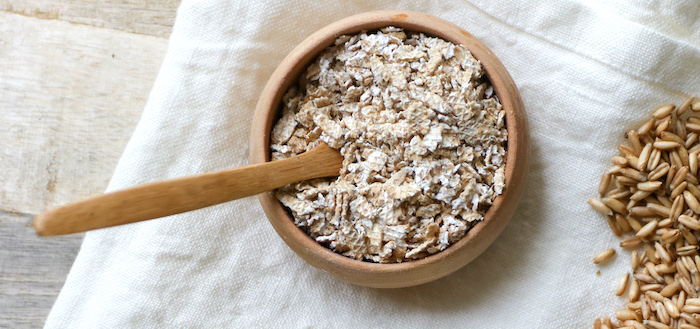
Benefits of Activated Oats
Naked oats in raw form are capable of germination. Exposure to water and heat brings the seeds to life and starts a transformation process:
- Enzymes (phytases) become active, which break down phytic acids (1).
- Proteins are broken down into amino acids.
- The nutrient content increases and the nutrients become more bioavailable. You can find more information about this HERE.
- Activated oats have an alkalizing effect
You can find more breakfast recipe ideas HERE.
Would you like to join our unique, based on nutritional sciences and practice-oriented training program for gaining a high level of health?
We are more than happy to inform you about our training program on our website!




0 Comments